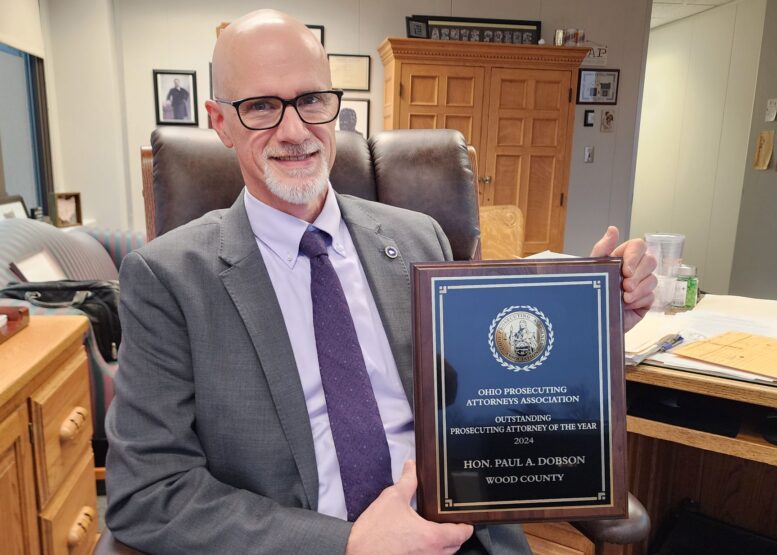By JAN McLAUGHLIN
BG Independent News
When Wood County Prosecuting Attorney Paul Dobson talks about prosecuting crimes, his focus is often on the victims.
“Our first step needs to be compassion,” Dobson said, repeating what he tells his staff. “That’s just such a central part of our job. We deal with incidents that we would never want to happen to us. I don’t want people to think we don’t care what happened to them.”
For his commitment to victims and prosecuting those who wronged them, Dobson was recently selected as Ohio’s Outstanding Prosecutor of the Year.
The stack of letters nominating Dobson for the state recognition talk of his relentless pursuit of justice, the creative programs he’s implemented to try to help overdose survivors, and the huge heart he reveals to victims of crimes.
Though he often acts as a consultant to staff as they handle cases, Dobson still prosecutes some himself.
“He never backs down from a challenge,” said Pamela Gross, chief of the criminal division in Dobson’s office.
He has taken an active role in promoting or protesting legislation that affects the prosecution of crimes and the impacts on victims.
“He’s not one-dimensional,” Gross said.
“Over the years, I have experienced firsthand Paul’s leadership, integrity and commitment to doing what is right,” said Wood County Administrator Carri Stanley, who previously worked as an attorney in Dobson’s office. “This has been most obvious in his pursuit of justice in criminal cases. He is a relentless advocate for victims of crime, and he is passionate about discovering the truth and holding those who hurt others accountable for their actions.”
“I have also seen him equally zealous in his handling of civil matters,” Stanley said. “Paul will litigate, when necessary, but recognizes that not every situation warrants a fight. He has facilitated difficult discussions and compromise between elected officials, emotionally charged employees, and outspoken members of the public. Paul is willing to seek solutions that require extra effort and analysis beyond the simple application of the law.”
Valiant for victims
Dobson often says he is inspired to do his best by people facing the worst moments of their lives.
“I’ve never known what it’s like to have a child killed, or have a life savings taken,” he said.
“There are heroic people who stand up as witnesses and victims. They won’t let that darkness control their lives,” he said of his motivation. “I’m not going to cower in the corner.”
Dobson has always looked at the victims’ perspectives – and has asked his staff to do the same.
“It’s important to him that victims are handled with the utmost care and kindness,” Gross said.
“He has the heart to do what is right. This manifests itself with how he works directly with victims,” Assistant Prosecuting Attorney David Harold wrote of Dobson. “That is especially noticeable in the hard cases – where worlds are overturned, and the shattered remnants of what had been normal seems forever lost. He grieves with the families of slain children. He is resolute in assuring that predators face justice. He comforts the elderly whose trust was exploited by caregivers. And that comes from his heart. And it shows.”
In a recent case, the relatives of deceased victims spoke only Mandarin, and were scattered in different parts of the world, according to Brian Boos, deputy chief assistant prosecuting attorney.
“Paul went above and beyond by utilizing an expedited translation program to ensure all victim representatives had the ability to communicate and be understood,” Boos said.
“Paul regularly reminds his staff that cases that may feel ‘routine’ to prosecutors are likely the most important or traumatic moment in a particular victim’s month, year, or even life. An assistant prosecutor might have 14 different breaking and entering cases pending at the same time, but to each victim, it is likely the first and hopefully only time a person will be a victim of a felony offense,” Boos said.
“Paul’s heart is his compass,” Court Administrator Brandy Hartman stated in her nomination of Dobson. “It guides him far beyond the courtroom, driving his tireless fight for those who cannot fight for themselves.”
Prior to legislation being passed requiring that victims be notified of proceedings in their cases, Dobson had already made that a priority.
“Even before Marsy’s Law, Paul worked diligently to inform, help, and protect victims and provide them justice,” Chief Assistant Prosecutor Jim Hoppenjans said.
“Paul takes that to another level, and always has,” said Annie Wilson, administrative director in the prosecutor’s office. “He tries every way to notify people – short of sending a drone.”
New approaches to old problems
Union County Prosecuting Attorney David Phillips noted some of Dobson’s creative solutions to remedy complex problems.
In 2017, Dobson and Wood County Sheriff Mark Wasylyshyn created the Wood County Addiction Response Collaborative. The ARC program offers a quick response team which works to get overdose survivors involved in treatment and recovery outside of the criminal justice system.
The horror of the opiate epidemic was not some distant tragedy for Dobson, who lost a stepson to opiates in 2016.
His stepson, who was 37 when he died of an overdose in Colorado, had struggled with opiates, recovered, then relapsed. As part of treatment, he went through an Ohio Means Jobs program in Toledo, which gave him an opportunity to go to the University of Toledo, where he earned certification. The program gave him gas cards, a laptop computer and helped with car repairs.
“They were taking away every excuse to fail,” Dobson said.
But eventually, his stepson – who moved to Denver for a job – overdosed and died. Though his stepson was ultimately not helped with the intense programming, Dobson is hoping that others will be.
“There’s always hope. My faith doesn’t allow for me to not have hope,” he said when introducing the ARC program.
Within the ARC, Dobson created the prosecutor’s office’s first diversion program, where low-level first-time offenders whose crimes stem from drug use can engage in a 12-week interactive course to teach them mechanisms to avoid drug abuse and addiction. Successful completion of the program means dismissal of the criminal charges against the participant.
Dobson also leads other innovative programs in the community, including Teen Court – a diversion program designed as an alternative to traditional court proceedings. The program is based on the premise that young people respond positively to the influences of their peers. Teen Court is a “second chance” for youth who have made poor choices – using peer influence and early intervention to prevent recidivism.
Another program started by Dobson came with a wet nose and wagging tail.
In his pursuit of making the prosecution process more bearable for victims, Dobson worked for years to get the county’s first courthouse facility dog. Norie, a black lab, is trained to give comfort and courage to victims of crime.
“We prosecute the worst things people do to each other,” Dobson said when Norie arrived at the courthouse last year. To find justice, crime victims often have to share details that are “painful, personal and sometimes in excruciating detail.”
The result is often retraumatizing to the victims, he said.
Norie, trained by the Ability Center of Greater Toledo, can recognize 40 cues.
“Finding ways to help victims through the criminal justice process was always a focus for Paul,” said Annie Wilson, Norie’s handler.
Norie has been trained to ignore distractions, endure distances, and withstand durations – whatever is needed. So she will rest her chin in a hand, or spread out on a lap until she is told to do otherwise.
If a victim wishes, Norie will lay quietly next to them as they testify in court.
Path to prosecuting
Dobson was originally hired as an assistant prosecuting attorney by Alan Mayberry, then served under Ray Fischer before taking over the top seat himself 16 years ago.
But Dobson’s pathway to becoming a prosecuting attorney took a winding road. He first earned a teaching degree in high school English. The lessons he learned stuck with him – proof of that being a small sign in his corner office warning people that he is silently correcting their grammar.
However, when he graduated there were no teaching jobs available. So he took a job as a hospital anesthesia tech, where he met his wife to be.
As he did some soul searching about his future, his dad offered some advice.
“You argue so much, you should be a lawyer,” he said.
After getting his law degree, Dobson went into private practice, often handling cases in bankruptcy court. But then the terrorist attacks of 9/11 happened, changing the trajectory of his career in law.
“I remember standing there thinking – this isn’t what I consider important,” he said.
Since then, he’s been focusing on doing work that matters.
“Paul is not afraid to tackle difficult and complex cases,” Union County Prosecuting Attorney David Phillips wrote in his nomination of Dobson for the statewide recognition.
Those cases include the indictment of fraternity members accused of actions leading to the hazing death of a BGSU student, a Toledo man accused of stabbing a 67-year-old man during a robbery, and the CEO of a charity charged with taking money donated to help victims of global disasters. He ordered the exhumation of a murder victim to better understand the cause of death following a hung jury to prepare for a retrial, and obtained a guilty plea on a double murder of Bowling Green restaurant owners.
Dobson is also dogged in his pursuit of finally finding justice in cold cases.
In 2009, Michael Dixon was found guilty of the 1987 murder of Karen Sue Hirschman, 22, in her Bowling Green apartment. It was later DNA evidence that finally connected Dixon to Hirschman’s murder. “No one can possibly conceive the depth of the pain they have suffered and will continue to suffer,” Dobson said of her parents.
In 2010, Ralph Doren was pronounced guilty for the second time of aggravated murder for cutting the throat of 19-year-old Deanna Meeks of Northwood in 1991. The former Sylvania man had been convicted of the same charge following a jury trial in 2006, but his conviction was thrown out by the 6th District Court of Appeals in 2009. Dobson was pleased the verdict in the second trial allowed him to report to the family that their daughter’s murderer was found guilty again.





